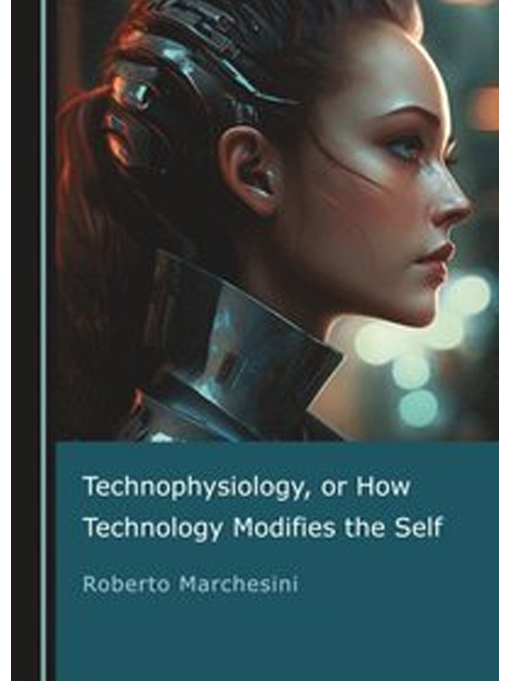Technophysiology, or How Technology Modifies the Self, 2023
Roberto Marchesini
2023 – CAMBRIDGE SCHOLARS PUBLISHING
pag.242
The book aims to address the theme of the transformation of the body by technology, offering
a general overview with a focus on new technologies. The technological development of the
last few centuries calls for a radical revision in our way of considering technology along with
its basic philosophical points of reference. The basic assumption of the essay is that we need
to go beyond the humanistic model which continues to view technology as a sort of garment
or a workshop that enables the human being to: improve its performance, pursue its goals,
provide tools for its verticalization/ascent in the world and emancipate the individual from
needs and fragilities. In order to understand the close relationship between the body and
technology, I will address the topic not only through an examination of the physiological
organization of the body in its relationship with the environment, but also by taking into
consideration the Evo-Devo theories that consider the body as an entity integrated within an
ecological niche. Because of the body’s plasticity and its adaptive capacity in ontogenesis,
technology has always modelled the somatic dimension of the human being. The dynamism of
human morpho-physiology, however, should not be attributed to an incompleteness or a
deficiency, but to its redundancy, something which confers virtuality to it. The book therefore
aims at revealing our need for a new anthropology, no longer based on biological deficiency,
but on the interactivity of the body. Thanks to its biological attributes – such as the
redundancy of the central nervous system or the musculoskeletal conformation – the body coevolved
with the technical device. Some of the cornerstones of the humanistic interpretation
have collapsed, such as the theory of human incompleteness, the ergonomic and disjunctive
dimension of technological support, the compensatory, amplifying and liberating vision of
technomediation, the self-sufficient reading of the ideational and design process, and the
presumption of full human control over the functions and structure of the machine.
The convergence of several technopoietic directives – such as nanotechnologies, biosynthesis
and neural networks – produces an acceleration of situations that surpass the capacity of the
traditional philosophies born in the wake of humanism to provide adequate interpretative
and predictive keys. The book stresses the extent to which we might face problems in
interpreting new technologies, if we continue to address them with inadequate philosophical
models: these models conceive technology as an instrument, that is, as a passive entity under
human control, whose function is external to the body. As this essay shows, we need to talk
about technophysiology, i.e., about a new way of reading our relationship with technology,
which is becoming growingly infiltrative and resembles more and more a partnership. We get
the impression that there is a considerable gap, even if only temporal, between what
technology makes possible and our philosophical ability to understand its consequences and
the existential spaces opened by the new supports. Cultural imaginary still relies on rhetorical
figures that do not allow us to grasp, even in a broad or partial way, the specific impact of a
technical innovation but, above all, what new existential dimensions and related fields of
research open up as well as what applications suddenly become possible. In just about forty
years, for example, the spreading of personal computers has profoundly changed people’s
lifestyles and, consequently, the cognitive functions addressed, required or neglected. As a
matter of fact, posture, prattognosis, attention system, the mechanisms of arousal and stress
have changed. Thanks to the progressive miniaturization of these supports and their
versatility, in a short time computer technologies have found their place in electronic games,
mobile phones and music track players, becoming the gadget par excellence. Caught in this
embrace, the body has made room for the computer: like in a successful transplant, this graft
has changed the way of thinking of individuals and their social expectations. The increasingly
immersive digital attendance, so assiduous as to involve the younger generations for over
eight hours a day, has had shocking effects on their psychological condition; today we are
already beginning to notice the consequences, which are not always pleasant, however, but
which reveal how deep these technologies have infiltrated.
Our somatic organization must always welcome and agree with the support, through
processes of reciprocal adjustment that involve both the development of peculiar techniques
of use and the coming about of new developmental pressures on the organism. When a
technical-mediated condition is inaugurated, the standards of performance and feedback on
the various organs are modified. Through the device, the body builds new perceptive and
operational interfaces with external reality, so we witness a transformation of the sensory
correction mechanisms, both of sensitivity and of agency. Undoubtedly, in acquiring the
instrument, the whole organism undergoes a profound change: it is a metamorphosis that
involves neurobiological wiring, the endocrine setting, the immune response, sexuality, the
musculoskeletal chassis, the great organic functions, the biorhythm and cell turnover. This is
the reason that prompts me to posit that technology is always infiltrative, that is to say, it
embodies itself, even when at first glance it might seem to limit itself to clothing the body,
wrapping it like a glove, protecting it from contamination.
New technologies require us to go beyond our traditional view and perception of devices and
define a new philosophy of téchne, which takes into account the ontological metamorphosis
triggered by our relationship with devices. In order to understand this aspect we need, first of
all, to shed light on the somatic changes that occur when the human being gets accustomed to
a new device enters . In this essay I want to examine the effects technology produces on the
body from the point of view of the morphological configuration and organization of functions.
I use the term technophysiology to refer to this impact, which is transforming our way of
“being in the world”: our perception of reality, the identity we build of ourselves, the
expectations we have and the meaning we attribute to our life. Being a body means, in fact,
living in coherence with the somatic dimension that characterizes us, but this is not free from
the modifications that technology imparts to the body.






